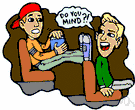irritation
Also found in: Thesaurus, Medical, Encyclopedia, Wikipedia.
ir·ri·ta·tion
(ĭr′ĭ-tā′shən)irritation
(ˌɪrɪˈteɪʃən)ir•ri•ta•tion
(ˌɪr ɪˈteɪ ʃən)n.
Irritation
(See also VEXATION.)
flea in the ear Discontent or uneasiness caused by a broad hint or warning, especially one which arouses suspicion; restlessness caused by an unexpected or undesired reply, usually one which is a vicious or humiliating rebuff or reproach. Cited for centuries in literature from throughout the world, this expression refers to the restless and distressed behavior characteristic of a dog afflicted with a flea in its ear.
He went away with a flea in his ear,
Like a poor cur.
(Francis Beaumont and John Fletcher, Love’s Cure, 1625)
gadfly A pest, nuisance, or bother; one who irritates, annoys, or tries to involve others in one’s cockeyed schemes. Literally, a gadfly is an insect which bites and goads other animals, especially cattle. Figurative use of the term dates from the mid-17th century. Currently, corporate gadfly is frequently heard to describe one who disrupts corporate or stockholder meetings with unconventional questions and challenges. To have a gadfly, dating from the late 16th century, means ‘to gad about,’ or ‘to rove idly.’ Gadfly can also be used adjectivally, as in the British gadfly mind, denoting an inability to concentrate.
get in [someone’s] hair To pester, annoy, irritate; to nag, henpeck; to be a nuisance. The persistent irritation of the scalp caused by hair lice is the probable source of this common expression.
She got in my hair until I couldn’t bear it another day. (J. Tey, Shilling for Candles, 1936)
get under [someone’s] skin To irritate or annoy; to impress or affect deeply. This expression alludes to mites, ticks, and other small, parasitic arachnids and insects which embed themselves in the skin of a victim, causing itching, irritation, and inflammation. In contemporary usage, the phrase frequently implies deep affection or love, emotions exemplified in tine classic Cole Porter song, “I’ve Got You Under My Skin” (1936).
pea in the shoe Any petty irritation or annoyance; a source of minor discomfort or distress; a thorn in the side. A literal pea in one’s shoe is too small to seriously affect one’s walking ability, but nevertheless large enough to be a source of considerable discomfort.
a thorn in the flesh A source of constant irritation, affliction, or inconvenience; a perpetual pain-in-the-neck. A sect of Pharisees used to place thorns in the hem of their cloaks to prick their legs in walking, and make them bleed. The expression no longer refers to self-imposed suffering, however, but to objectionable external conditions or parasitical acquaintances. St. Paul used thorn in the flesh in 2 Corinthians 12:7:
And lest I should be exalted above measure through the abundance of the revelations, there was given to me a thorn in the flesh, the messenger of Satan to buffet me, lest I should be exalted above measure.
A common variant is thorn in the side.
The Eastern Church was then, as she is to this day, a thorn in the side of the Papacy. (James Bryce, The Holy Roman Empire, 1864)
| Noun | 1. |  irritation - the psychological state of being irritated or annoyed irritation - the psychological state of being irritated or annoyedmental condition, mental state, psychological condition, psychological state - (psychology) a mental condition in which the qualities of a state are relatively constant even though the state itself may be dynamic; "a manic state" bummer - an experience that is irritating or frustrating or disappointing; "having to stand in line so long was a real bummer" pinprick - a minor annoyance impatience, restlessness - a lack of patience; irritation with anything that causes delay snit - a state of agitated irritation; "he was in a snit" |
| 2. |  irritation - a sudden outburst of anger; "his temper sparked like damp firewood" irritation - a sudden outburst of anger; "his temper sparked like damp firewood" | |
| 3. | irritation - (pathology) abnormal sensitivity to stimulation; "any food produced irritation of the stomach" pathology - the branch of medical science that studies the causes and nature and effects of diseases abnormalcy, abnormality - an abnormal physical condition resulting from defective genes or developmental deficiencies sensitisation, sensitization - the state of being sensitive (as to an antigen) | |
| 4. | irritation - the neural or electrical arousal of an organ or muscle or gland arousal - a state of heightened physiological activity | |
| 5. | irritation - an uncomfortable feeling of mental painfulness or distress | |
| 6. |  irritation - unfriendly behavior that causes anger or resentment irritation - unfriendly behavior that causes anger or resentmentaggro - (informal British usage) aggravation or aggression; "I skipped it because it was too much aggro" aggression - deliberately unfriendly behavior last straw - the final irritation that stretches your patience beyond the limit | |
| 7. |  irritation - the act of troubling or annoying someone irritation - the act of troubling or annoying someonemistreatment - the practice of treating (someone or something) badly; "he should be punished for his mistreatment of his mother" exasperation - actions that cause great irritation (or even anger) red flag - something that irritates or demands immediate action; "doing that is like waving a red flag in front of a bull" |
irritation
annoyance ease, calm, composure, pleasure, satisfaction, serenity, tranquillity, quietude
irritation
nounirritation
[ˌɪrɪˈteɪʃən] Nshe could not conceal her irritation → no podía disimular su irritación or enfado
irritation
[ˌɪrɪˈteɪʃən] nThese oils may cause irritation to sensitive skins → Ces huiles peuvent provoquer des irritations chez les personnes à la peau sensible.